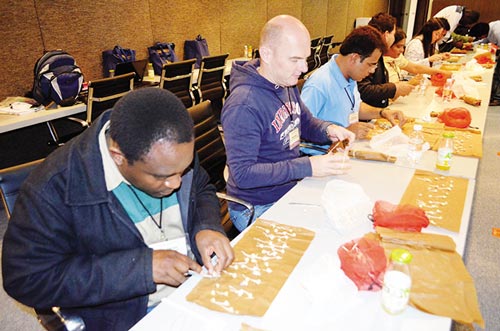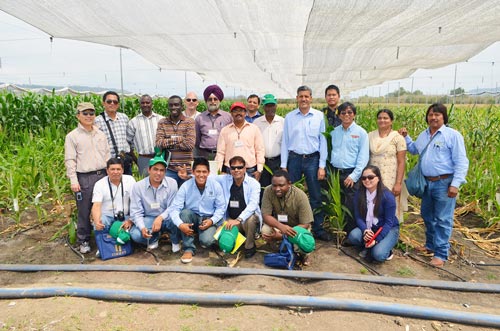 To expand awareness on DH-based breeding and build the capacity of national partners, the CIMMYT Global Maize Program organized the second international training course on doubled haploid technology in maize breeding at El Batán, Mexico, from 4-8 March 2013. Sixteen participants from 10 countries (Ethiopia, India, Kenya, Mexico, Netherlands, Peru, Philippines, South Korea, Thailand, and Zimbabwe) attended the course that provided both theoretical and practical exposure to the DH technology and its applications in maize breeding.
To expand awareness on DH-based breeding and build the capacity of national partners, the CIMMYT Global Maize Program organized the second international training course on doubled haploid technology in maize breeding at El Batán, Mexico, from 4-8 March 2013. Sixteen participants from 10 countries (Ethiopia, India, Kenya, Mexico, Netherlands, Peru, Philippines, South Korea, Thailand, and Zimbabwe) attended the course that provided both theoretical and practical exposure to the DH technology and its applications in maize breeding.
The course included lectures on some key topics: DH line development, DH-based maize breeding, potential benefits of using DH technology in breeding programs, rapid cycle breeding with DH lines and genomic selection, and the use of DH lines in genetic studies. Particular emphasis was laid on practical demonstration of all important steps in the DH production process, including haploid inductions, haploid kernel identification, chromosome doubling, and agronomic management of the D0 (haploid plants subjected to chromosomal doubling) nursery to derive DH lines. The participants visited the laboratory, greenhouse, and fields at the Agua Fría Experiment Station, where they gained hands-on experience in identifying haploid kernels based on anthocyanin color marker system, safely subjecting the haploid seedlings to chromosomal doubling treatment, and assessing the haploid induction rate using the liguleless genetic stock. During the field visits, they saw the newly developed first-generation tropical inducers vis-à-vis temperate inducers in tropical environments, design of the induction nursery, agronomic management of the haploid induction and D0 nurseries, and current efforts by CIMMYT Maize Program to develop second-generation haploid inducers.
The course was organized by Vijay Chaikam and Sotero Bumagat. Chaikam and Bumagat also delivered lectures throughout the course, along with other CIMMYT scientists, including George Mahuku, Thanda Dhliwayo, and Xuecai Zhang, and an invited speaker Brian Dilkes from Purdue University. Leocadio Martínez and Luis Antonio López, CIMMYT maize technicians, significantly contributed to the practical demonstrations.
During the feedback session, participants rated the course as “excellent,” highlighting the complete technical package given to them through lectures and practical demonstrations. “This course gave me the opportunity to acquire the skills that will enable me to make more objective decisions when adopting and utilizing the DH technology in our breeding programs,” concluded one of the participants.

 Capacity development
Capacity development 
